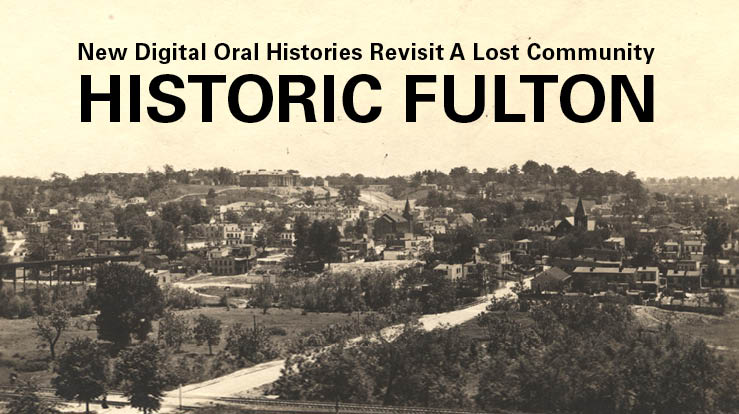Historic Fulton oral history project now online, providing better access to important voices
April 15, 2015
VCU Libraries announces the next stage in telling an important and little-known story of the once-vibrant Historic Fulton community that fell victim to 1970s urban renewal.
The Historic Fulton Oral History Project is now digital. Transcripts are searchable. Audio files that literally give these accounts voices are also available.
“We are very excited to partner with The Valentine and the Historic Fulton community to make this important collection accessible online,” said Lauren Work, VCU Libraries digital collections librarian.
The physical neighborhood of Historic Fulton, a venerable history-rich section of Richmond that had declined into blight and slum-like conditions, was razed in the early ‘70s. Gone were some 800 houses and businesses. While the physical neighborhood was lost, emotional ties to the East End community remain strong. The oral histories capture memories, observations, facts and, for some, sadness and outrage at what was taken from Historic Fulton residents.
The team that initiated the oral history project was The Valentine, the Neighborhood Resource Center (NRC), Virginia Local Initiatives Support Corporation (LISC), and the Greater Fulton’s Future Legacy Committee (GFF). The project was funded by a grant from Virginia LISC and is part of the Greater Fulton’s Future Plan. At its onset, Veronica Fleming, then Virginia LISC senior program officer, said theoral history project would be a model for other community documentation efforts nationwide. “Neighborhood revitalization is not just about bricks and mortar projects. It is also about preserving history and creating pride in communities.”
The project was spearheaded by former Valentine curator Suzanne Savery. During 2011 and 2012, Caroline Morris, then a College of William & Mary history doctoral student, and Project Coordinator Corliss Freda Johnson interviewed current and former residents of Historic Fulton.
“Finally, we have a chance to share our story. Fulton is gone and this project will keep it alive,” reflected Johnson.
The Historic Fulton Oral History collection contains 17 interviews with 32 named interviewees, teachers, activists, clergy and community leaders who grew up in the predominantly African-American community in the 1930s through 1950s. The interviewees also witnessed the death of Historic Fulton through Richmond’s urban renewal efforts.
The collection presents the unique perspectives of these residents. As Historic Fulton undergoes more change with the pending arrival of the Stone Brewery in Rocketts, oral history participant the Rev. Mary Perez reflects, “Historic Fulton as we knew it, lived and loved it, was taken, but our memories will never be taken away.”
The Valentine is the repository for the project and holds copyrights. Physical copies of the oral history transcripts have been distributed to various research institutions in the Richmond region, including James Branch Cabell Library’s Special Collections and Archives. VCU Libraries involvement was at this last stage—providing a stable, accessible digital platform for paper and audio files to house these important voices.
Making the project available in a searchable, digital format with streaming audio will expose these oral histories more broadly to researchers and residents alike at a time when interest in Historic Fulton is keen and the region is poised for renewal. The new Stone Brewing Company is locating to Fulton, heralding a potential rebirth of a forgotten community in coming years. “We expect this new collaborative collection to perform at the same high level as our other historic collections, to be used in courses and research at the university and in the community, and to receive thousands of touchpoints nationwide through its online visibility,” said Work.
“The Historic Fulton Oral History Project will be an invaluable research tool as students and scholars begin to examine what happened in Fulton during the 1970s,” said Meg Hughes, curator of archives for The Valentine. “Hearing firsthand accounts of living and working in this neighborhood brings Fulton to life.”
VCU Libraries has long fostered these sorts of partnerships in community and neighborhood documentation as part of our core values.
Said University Librarian John E. Ulmschneider: “VCU Libraries is proud to present and preserve this digital collection alongside its previous online efforts, such as Carver Community Oral Histories, Farmville Civil Rights Photographs, Voices of Freedom Oral Histories, and Jackson Ward Architectural History." These collections are available online. http://dig.library.vcu.edu
< Previous Next > Chat
Chat